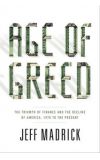
09 Jun 2011 05:20:29
Trouble is, complains author Jeff Madrick in "Age of Greed," for almost half a century some extremely clever and occasionally unscrupulous people have concentrated so much on the first motive, they've forgotten the second. He sums up that process in a subtitle: "The Triumph of Finance and the Decline of America, 1970 to the Present."
Oddly, Bernard Madoff doesn't appear in the book's index. Maybe his fraud was too simple. All he did to deserve a 150-year sentence was to take in money from investors, divert it to his own purposes and pay back the investors who asked for their supposed profits by using money that arrived from new victims.
The recession was a bigger matter.
"... Wall Street professionals got fabulously rich," Madrick writes in an "Epilogue" after describing what happened in meticulous detail. "They channeled hundreds of millions of dollars into wasteful investments that could have been spent on energy, transportation and communications infrastructure, health care and medical research, education, technical and business, R&D, and new, truly innovative consumer products and business equipment.
"... But the largest cost of the crisis was the steepest recession since the 1930s. (Production) fell sharply. Eight million jobs were lost. And recovery in the subsequent year and a half beginning in mid-2009 was slow, and will likely stay slow, resulting in considerably higher unemployment and lower national income for many years (more) than could have been realized. Federal tax revenues were and will continue to be reduced accordingly, and the budget deficit will be much higher as a result."
He makes a good case — and financial news junkies will savor it. Some will call it partisan. Regrettably, a considerable number will find it hard to plow through.
Those with the concentration to do that will acquire a good basis for judging the difference between the contrasting remedies for recession that arise from the work of two of the most prominent economists of the 20th century: Milton Friedman and John Maynard Keynes.
Friedman, mostly favored by Republicans, would reduce taxes and the size of government, confident that the savings to taxpayers would increase their spending as consumers and nourish job-creating private industry. Keynesians, mostly Democrats, would raise taxes so government would have money to improve public services that create jobs directly.

